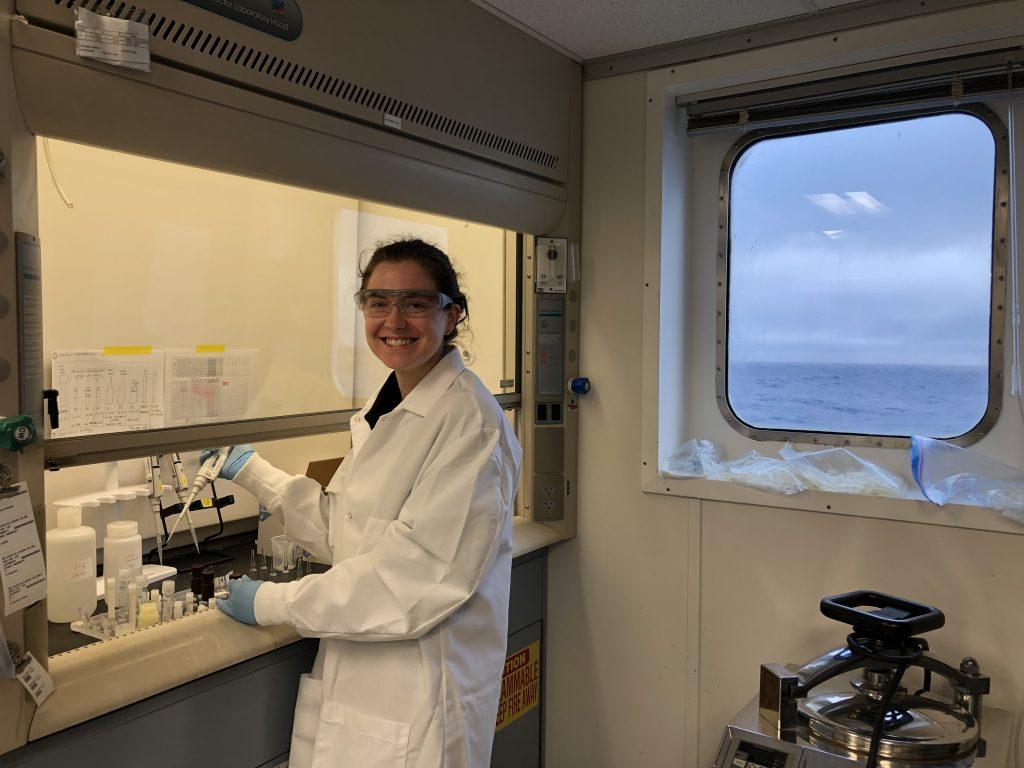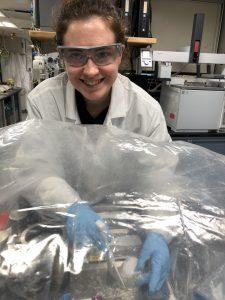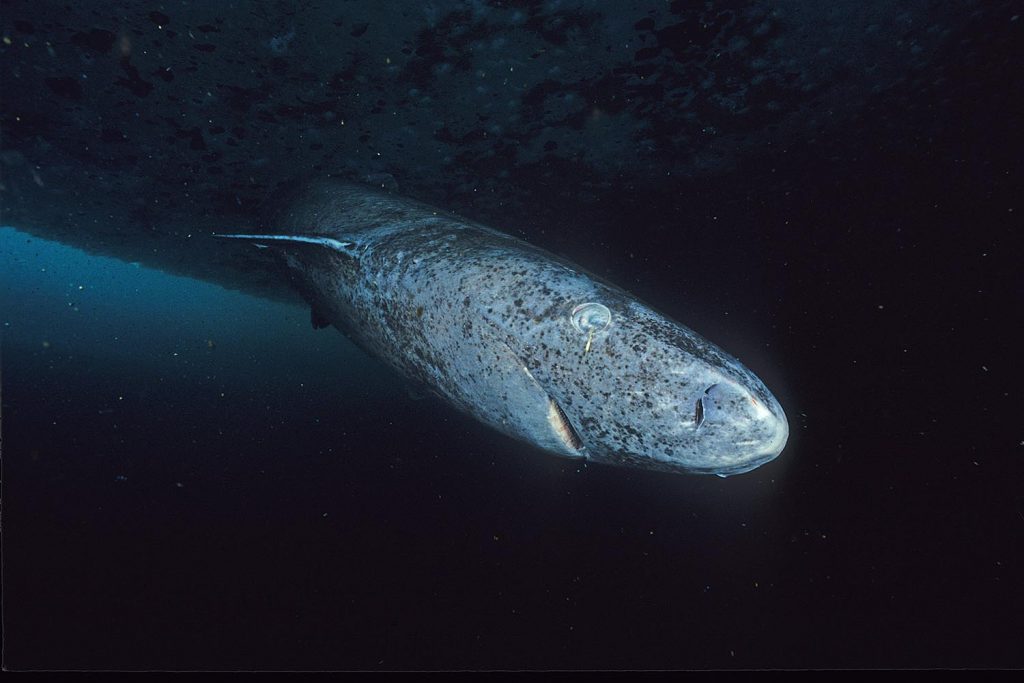
Career Spotlight: Inorganic Geochemist Lisa Herbert

Lisa Herbert Interview
Please describe your job duties while on the JR. What will you be doing on a daily basis?
-
-
-
-
-
-
-
-
- I will be taking whole round pieces of core and squeezing them to get the water out. We save the solid sediment and freeze it for later analysis, and then split the pore water into different aliquots for various analyses: pH, alkalinity, dissolved element concentrations, salinity, etc. We also analyze the elemental composition of the bulk sediment using ICP-OES.
-
-
-
-
-
-
-
Describe one instrument or tool that is essential for you to do your job? Or a piece of equipment on the JR that is useful and why – what does it do?
-
-
-
-
-
-
-
-
- The core squeezer! It’s the easiest and most efficient way to separate the pore water from the solids, which can be hard to do in dense mud. It does exactly what it sounds like—it puts pressure on a piece of core until the water comes out. We collet the water with a syringe, then filter the water and separate it for further analyses.
-
-
-
-
-
-
-
Why is your work (or research) important? What question are you trying to answer or how does your work/research help assist/advance scientific knowledge?
- I am interested in bio-relevant metals, like iron, manganese, cobalt, nickel, and copper in the ocean. These metals are critical nutrients for living things (including humans—just look at your vitamin bottle!) but they only exist at very low levels in ocean water. So any changes in the output or input of trace metals in the ocean can have a big impact on the growth of photosynthetic plankton in the surface ocean, which play a role in the climate cycle by sucking carbon dioxide out of the atmosphere. Trace metal delivery to the ocean seems to have changed between warm/wet and cool/dry periods in Earth history, because ice sheets, glaciers, and deserts supply dust and other trace metal-rich materials to the open ocean. I am particularly interested in whether there were “pulses” of trace metals introduced to the oceans during transition periods between glacial and interglacial, when there was a lot of ice melt, glacial retreat, and icebergs in the oceans (analogous to the current period of anthropogenic ice melt). Answering this question will hopefully help us predict what will happen in the current oceans as warming advances and ice retreats in the next decades.

Why the ocean? What made you choose a career at sea or career that involves the ocean?
- To me, the ocean is where everything comes together. I have always loved biology, geology, and environmental science (particularly climate science), and in oceanography, none of these spheres are separate. By studying marine science, I could explore the boundaries and interactions between biology, chemistry, and geology in one of the largest interconnected systems on Earth: the global ocean. The ocean is also intimately linked to the climate, so whatever work I do can contribute to our efforts to understand and combat climate change. That “higher level” goal is what really keeps me going when the work gets tedious or discouraging.
What are you most excited about for this expedition and/or being on the JR?
- I am most excited to be part of a group of brilliant people all working together. Second, I feel like you develop a special bond with people with whom you are working so closely and intensely with. I think the “family” you form on an expedition like Ex. 383 is a beautiful thing, and I am thrilled to be a part of it.
What are three things you think are needed for a successful expedition at sea? And Why!
- Humor – being able to laugh and have fun together will be important for keeping us going when the going gets tough.
- A spirit of openness and sharing. Sometimes scientists can be secretive and protective of their own data, and that simply isn’t fair in an expedition like this. Working together we can accomplish SO much more than if each of us try to do it alone.
- A good ship and crew! It boggles my mind the amount of planning, preparation, and hard work it takes to run a ship like this in challenging conditions, and every crew, tech, and cleaning person on board has my utmost respect.
If you could answer one question about our Earth – what would it be and why?
- I would want to know what causes the Antarctic and Greenland ice sheets to collapse, and how exactly it has happened in the past. I think this is one of the biggest potentially catastrophic threats surrounding climate change—if the West Antarctic Ice Sheet collapsed, we could have 20+ feet of sea level rise—but since we don’t know how this happened in the past, we have no way of predicting whether or how it could happen today. If we could predict it happening, then we have a chance to prepare and minimize the catastrophe.
What is your favorite sea creature and why?
- The Greenland shark! They are mysterious and super ancient – there are some alive today that were born when we still thought the Earth was flat!! I love the thought of animals living in the depths that we know next to nothing about.

What message do you have for anyone considering a career at sea or a career involving the ocean sciences?
- If you want it, go for it! Anyone can be a scientist, and being a scientist can bring adventures you never dreamed were available to you. That’s what’s happening for me, and I’m so grateful for it.
Do you get sea sick? If yes or sometimes, please also select the other tab and describe how you cope with it.
- I thought I would, but so far I haven’t gotten sick at all.
The need for space comes in many forms. Which type of space, in general, is the most important to you?
- _X__Personal (Private) Space
- _X__Creative Space
- _X__Outdoor Space
- ___Emotional Space
- ___Physical Space
- ___Spiritual or Meditative
- ___Outer Space
- _X__Community Space
- ___Quite Space
- ___Productive/Work Space
- ___Digital/Virtual Space
- ___Public Space
- ___Inner Space
- ___Other:
Why that type of space? What makes it important to you and will it be available while on the JR?
- Sorry, I couldn’t choose just one! If I really HAD to, I guess I would choose Private Space. I really value relationships and love to be a part of a community, which I already feel I have on the JR. But I am never completely relaxed in the company of other people, so I also need at least a little time and space every day to be completely alone, so I can recharge my batteries.